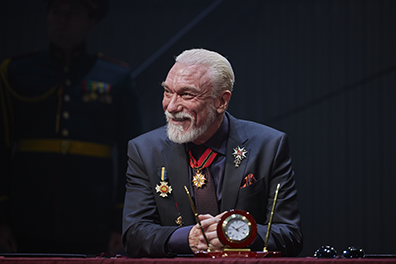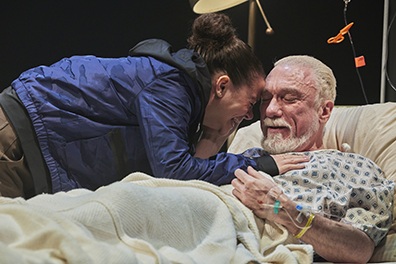King Lear
The Eyes Have It
Shakespeare Theatre Company, Klein Theatre, Washington, D.C.
Wednesday, March 1, 2023, (middle left stalls)
Tuesday, March 21, 2023, D-111 (middle front stalls)
Directed by Simon Godwin
 Patrick Page greets his court in the opening scene of the Shakespeare Theatre Company's 2023 production of William Shakespeare's King Lear in Washington, D.C. Page's Lear is a man of controlling authority—until he isn't; and he plays that passage with scary authenticity. Photo by DJ Corey Photography.
Patrick Page greets his court in the opening scene of the Shakespeare Theatre Company's 2023 production of William Shakespeare's King Lear in Washington, D.C. Page's Lear is a man of controlling authority—until he isn't; and he plays that passage with scary authenticity. Photo by DJ Corey Photography.Somewhere in this mess of a house I live in hides my file folder for the 2023 Shakespeare Theatre Company's production of William Shakespeare's King Lear starring Patrick Page in the title role. The folder contains, most importantly, my notes from the two performances I attended at the Klein Theatre: on opening night, sitting about 10 rows back and to the far left; and three weeks later in my season subscription seats in the center of the fourth row. Adhering to my professional journalists' standards, I can't reasonably write a full review of the Simon Godwin-helmed production without those notes. Relying on my memory is bound to lead to inaccurate reporting.
However, some moments of Page's performance are seared indelibly into my brain: first, in a scene in which he played me; last, in a scene in which he played my wife, Sarah, who has Alzheimer's and now resides in a memory care center; and between those, a scene in which he played both Sarah and me.
For this modern dress production, Godwin remained relatively true to Shakespeare's text, excepting major cuts to get the show down to just a bit over two hours. Former Washington Post theater critic Peter Marks considered it one of the best productions of Lear he'd ever seen, lauding how Godwin's trims created a muscular thriller out of Shakespeare's script. I agree with Marks' assessment, but I missed Shakespeare's genius of pacing the disintegration of the king's mind and the resulting parallel disintegration of the society he once led. After all, I've been witnessing such a drawn-out disintegration of my wife's mind and the resulting parallel disintegration of the subsector society that is our mariage. Sarah has no daughters, only two devoted stepsons. However, as a retired Air Force colonel and three-time commander, she has, like Lear, a quality in her that people, such as Kent in the play, would fain call master: authority.
The production's opening scene takes place in an airplane hangar, with Page's Lear strolling through the doors and sitting at a large desk. Wearing a dark suit and tie, he appears vigorously handsome and fit for a four-score man. His authority and valor are presented in both his bearing and the medals pinned to his lapels and hanging from a ribbon around his neck. Gregarious and sharp, he manages the love contest of his three daughters with egotistical efficiency through the grandiose praises of his eldest Goneril (Rosa Gilmore) and middle daughter Regan (Stephanie Jean Lane). When his youngest, and favorite daughter, Cordelia (Lily Santiago), refuses to go along with the competitive spectacle, Page's Lear is surprised. He gently urges her to "mend your speech a little, lest it may mar your fortunes." Cordelia reasons that her love is more true being a portion of her full capacity for love unlike her sisters who profess total love but truly have little for him: "Why have my sisters husbands, if they say they love you all?" she asks.
Page shifts his portrayal of Lear into a specter I know all too well with a depression-based temper tantrum: sudden eruption—"Let it be so; thy truth, then, be thy dower"—followed by purposed pause. He doesn't want to go where he knows he's about to go, into a vocally explosive tyranny and a lurking threat of violence, never intended but nevertheless manifesting. He manages to heed his better senses and enter a calm. But BOOM!, some other self in his emotions-tangled conscience triggers the full-on tantrum. Page's performance here is a studied portrayal of a sympton of major depressive disorder, especially among males, and it is a valid candidate explanation of how and, more importantly, why Shakespeare's Lear in this scene insensibly escalates his anger with such seeming foolishness.
Sure, this could be an initial sign of senility given Lear's age, but Page's interpretation portrays with exacting accuracy my own such insensible escalations of temper. If it's senility it goes back to my 20s. Even the setting fits, the king's well-rehearsed (in his mind), stage-managed scheme suddenly, unexpectedly unraveling at the instigation of the person he loves most. This lost sense of control represents a disturbing fragility—or fear, perhaps—in a mentality that craves order, unleashing that other, more spontaneous self who reverses his initially sincere attempt to maintain calm.
I also know the shameful outcome, and how it may manifest in violence. Upon Lear disowning Cordelia, Kent (Shirine Babb) intervenes, and the king threatens to execute his trusted advisor with brandished sword before exiling her. Me? I visit my violence on inanimate objects (I've kicked file cabinets, thrown dishes and a typewriter at walls), and the only person I've attacked is myself (slapping my head silly, intentionally banging my skull into a door frame). Though I've never physically harmed or threatened anyone else, I do plead guilty to verbal abuses, and end up turning that verbal abuse on myself, too. These are also tantrum traits I share with Lear. Page pounded the desk on his initial explosion, and as he raged he wound the fibers of his soul so tightly that throughout the rest of this opening scene I expected his large desk to go flying into the hangar wall.
Let's jump ahead to Act IV, Scene 6, when Edgar (Matthew J. Harris) guides his blinded father, the Duke of Gloucester (Craig Wallace) to Dover. The Duke of Cornwall (Yao Dogbe) and his wife, Lear's daughter Regan, have gouged out Gloucester's eyes after accusing him of treason for spiriting Lear away from the clutches of their own treasonous intentions. Edgar, himself on the run and disguised as the mentally ill beggar Poor Tom after being falsely accused of planning to murder his father, acquiesces to guide his father to Dover. There, Gloucester intends to cast himself off the famous white cliffs. Edgar, who hasn't revealed his true identity to his father, tricks Gloucester into thinking he's survived the fall. Edgar is hoping to restore Gloucester's faith and will to live.
And then, Lear shows up, his mind totally given way to dementia as he prances around the field collecting flowers and feeding toasted cheese to mice only he can see. Here's a speech from the scene.
Nature's above art in that respect. There's your
press-money. That fellow handles his bow like a
crow-keeper: draw me a clothier's yard. Look,
look, a mouse! Peace, peace; this piece of toasted
cheese will do 't. There's my gauntlet; I'll prove
it on a giant. Bring up the brown bills. O, well
flown, bird! i' the clout, i' the clout: hewgh!
Give the word.
The last line is presumably spoken to Edgar, who replies, "Sweet marjoram," and Lear tells him, "Pass." When played as a password command and answer, it always gets a laugh.
Page does something with this speech I've never seen before—well, that's not true: I've not seen any Lear do it before, but I see his behavior almost daily in the dining room and halls at the memory care center where Sarah lives. Page plays this scene as a man with dementia (Alzheimer's?), living an existence far removed from those around him. He does have some brief glimpses of lucidity: he recognizes Gloucester at one point, and his philosophical take on how we come crying into "this great stage of fools" is as profound as some of the momentary but momentous expressions I hear from Sarah. The speech above is typical of the rambling descriptions of whatever images are flowing through an Alzheimer's-addled mind, speaking words with clarity but no connection.
Furthermore, Page, having mastered Shakespeare's language over years of training, practice, and experience, uses Shakespeare's verse structure as his guide. Notice how many stops (periods and colons) the playwright placed within each line, working in rythmic counterpoint to the line's beat. Page uses this stop-start structure to physically illustrate a new thought suddenly interrupting Lear's mental flow. I do wonder if Page the actor found his reading from frequent visits to a memory care center in preparation for the part. I'm certain Shakespeare the playwright must surely have written this scene from such an experience.


Top, Patrick Page as King Lear talks with his Fool (Michael Milligan) in the Shakespeare Theatre Company's 2013 production of William Shakespeare's King Lear. Above, Cordelia (Lily Santiago) comforts her confused father. Photos by DJ Corey Photography.
The audience is laughing because it truly is hilarious, and so it is in real life. Feeding Sarah her dinners I'm privy to what could be hit comedy club sketches though they are merely residents interacting with each other, with family, with staff, or just with themselves split into two or sometimes three different personas. I know, I know; it's really a sad thing and you might be recoiling at how I make light of these poor people with dementia. My response: if you default to that conclusion upon reading this, you have not experienced from the inside the ever-constant agonizing realities of being a caregiver of a loved one with Alzheimer's. To us, our loved ones' bizarre behavior becomes our new normal, and the funny moments truly are comic relief (emphasis on the latter word).
That leads us to the third scene of Page's remarkably truthful performance as King Lear, which required me to watch it twice to get the full depth of its truth. It comes in Act I, Scene 5 when Lear has just stormed out of Goneril's mansion in anger at her inadequate standards for hosting a retired king, let alone her father. Alone with the Fool (Michael Milligan), Lear suddenly says out of nowhere, "O, let me not be mad, not mad, sweet heaven; Keep me in temper: I would not be mad! Don't let me go mad; please, don't let me go mad." The first half of the line Page says to the cosmos; the second is an earnest plea to the Fool.
On opening night, I was taken with the overwhelming vulnerability in Page's delivery of these lines. This is a man only recently reigning over Britain, who can still rage up a storm (and, soon, literally into a storm), and suddenly he senses that he's losing his senses. Or, perhaps, already lost them. Several times I have heard his tone and seen his expression, not only the expression on his face but also in his posture. The tone I've heard out loud when I'm alone; the look I've seen in the mirror. Again, Page had reached a place I know too well, the panic attack, lost in the overwhelm of losing my capability or capacity to do anything, fearing the loss of sovereignty over my own mind.
When I watched this moment from the fourth row three weeks later, I realized Page was not representing me. This time I could see his eyes. They were Sarah's eyes. I've always admired how the best actors can mold not just their personalities but also their voices, faces, bodies, and limbs into a character so far removed from their natural physical beings. Nevetheless, what Page accomplished in this moment goes beyond skill and training to understanding what is involved in achieving an exact portrayal of the eyes of a person who has Alzheimer's, like my wife's eyes when she looks at me and says something similar to Lear's lines.
Sarah, however, rarely speaks a known language; her text is just a series of syllabic sounds or, sometimes, no vocalizing at all. It's all in her eyes, in Page's eyes, the eyes of someone losing their mind, not allegorically but literally as their brain slowly but inevitably slips into someplace they can't access. Nor can we—the Fool or the spouse—access that place no matter how truly we love our royal master or spouse. When I see those eyes in Sarah, I kiss her, wrap my arms around her shoulders, and assure her she is OK, she will be safe, and I will always be there for her. I'm her Fool, and that's a good thing, for me as well as for her. Sitting in D-111 at the Klein Theatre, all I could do was cry.
King Lear is my favorite Shakespeare play, though Henry IV, Part One and The Tempest give close chase. I've seen some incredible Lears, including Donald Sindon at the Royal Shakespeare Company, my first experience with the play; Colm Fiore at Canada's Stratford Festival; and Rick Foucheux at WSC Avant Bard in Alexandria, Virginia. Patrick Page belongs in that pantheon in terms of his performance, but he went one significant step further. Page didn't merely bring this fascinatingly complex and confounding character to life; he reflected Lear in my life.
Eric Minton
February 2, 2025
Comment: e-mail editorial@shakespeareances.com
Start a discussion in the Bardroom



 Find additional Shakespeareances
Find additional Shakespeareances